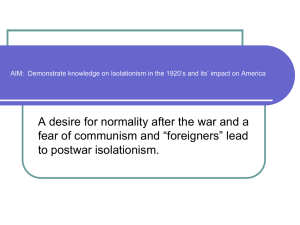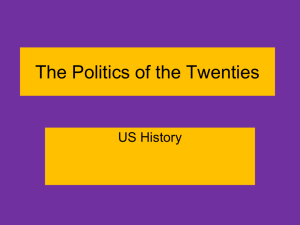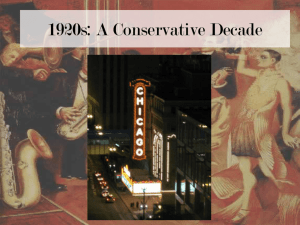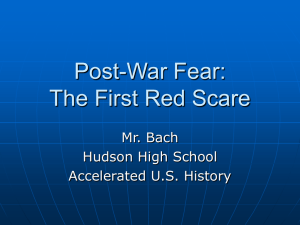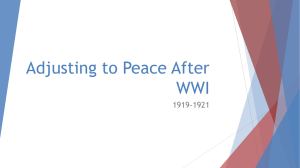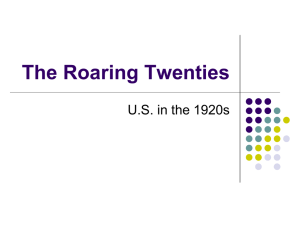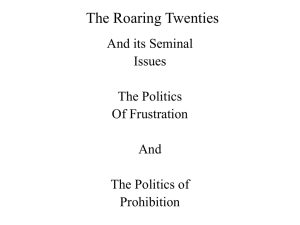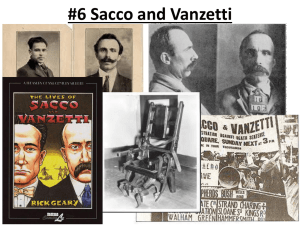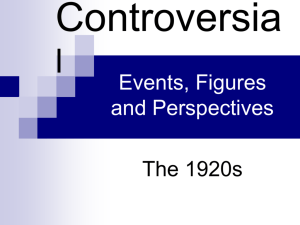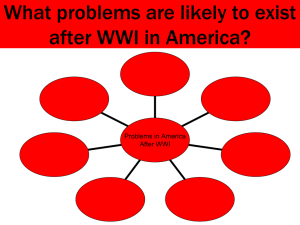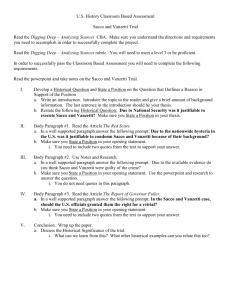Americans Struggle with Postwar Issues *Normalcy* & Isolationism
advertisement
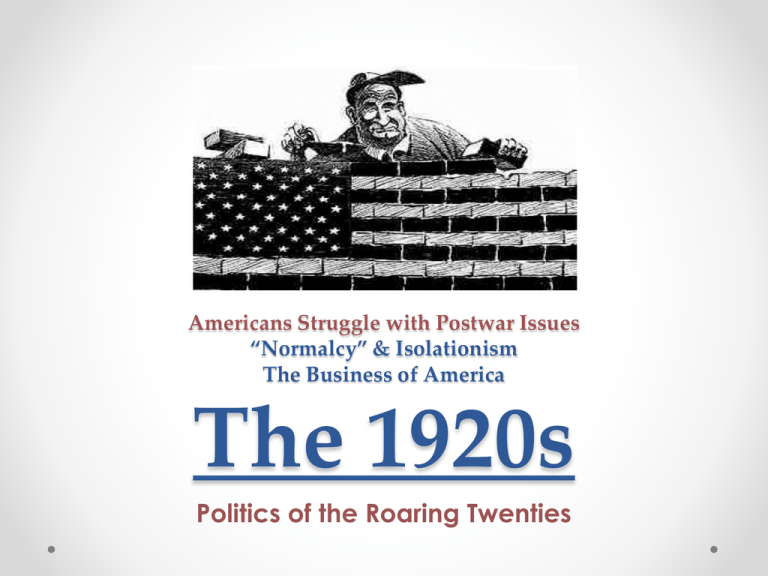
Americans Struggle with Postwar Issues “Normalcy” & Isolationism The Business of America The 1920s Politics of the Roaring Twenties What Soldiers Left… President Woodrow Wilson Wilson’s “crusade” for democracy. A traditionalist America. A society that wanted to get involved with world affairs. What Soldiers Came Back To… A world power that strived for President Warren G. Harding advancement, change, and enjoyment. A thriving America, but not joyous for all… “America's present need is not heroics but healing; not nostrums but normalcy; not revolution but restoration.” -President Warren G. Harding Americans Struggle with Postwar Issues The Impact of WWI on the USA 4,743,826 Active Serving Troops 53,515 Troops Killed in Battle (or as a result of…) 320,710 US Casualties THE WAR WAS WON, But Americans Desired A New Path 1. Nativism 2. Isolationism 3. Conservatism Changes Toward “Normalcy” Nativism “A sociopolitical policy favoring the interests of established inhabitants over those of immigrants.” Isolationism “A national policy of abstaining from political or economic relations with other countries.” Conservatism “Belief in the value of established and traditional practices in politics and society.” Nativism Why is the idea of nativism dangerous or “un-American”? It creates an “us” verse “them” mentality. Breeds racist ideas. A Cause Behind: The Red Scare. The second rise of the KKK. The trial of Sacco & Vanzetti. The Red Scare The Russian Revolution of 1917 Lenin led a communist uprising in Russia to establish the Union of Soviet Socialist Republics (USSR). Peace, Land, and Bread “Freedom in capitalist society always remains about the same as it was in ancient Greek republics: Freedom for slave owners.” – Vladimir Lenin & his call for a communist revolution. The Red Scare Small communist party formed in the United States during WWI, but did not get much attention. After the war, focus turned toward the communists. Fear was understandable… a small group had caused a revolution in Russia, what was stopping it from happening in the US? Soviet communists were “champions of the workers”. American communists also sided with labor unions. Americans were fed up with strikes, and thus connected labor unions to communist activity. The Red Scare The Red Scare of 1920 The Palmer Raids A. Mitchell Palmer After anarchists bombed his home: Few saw the difference between anarchists and communists. Palmer Raids resulted: 12 different cities conducted raids on anarchist meetings. Over 650 workers were arrested. J. Edgar Hoover Head of the Bureau of Investigation (Later known as the FBI) KKK in 1920 Peaked at over 5 million members in 1923. Desired to protect an “ideal American life” from African-Americans, Catholics, Jews, and immigrant “corruption.” Black Lynching in the United States from 1920-1929 1920 – 53 1921- 59 1922 – 51 1923 – 29 1924 – 16 1925 – 17 1926 – 23 1927 – 16 1928 – 10 1929 – 7 Total Killed: 281 NAACP Blots of Shame Map The KKK The Ku Klux Klan http://www.youtube.com/watch?v=vu0NuJ7mcgk Sacco & Vanzetti Nicola Sacco Bartolomeo Vanzetti 3 Strikes of Sacco & Vanzetti Immigrants Anarchists Location (Boston) “If it had not been for these things, I might have lived out my life talking at street corners to scorning men. I might have died, unmarked, unknown, a failure. Now we are not a failure. This is our career and our triumph. Never in our full life could we hope to do such work for tolerance, for justice, for man's understanding of man as now we do by accident. Our words — our lives — our pains — nothing! The taking of our lives — lives of a good shoemaker and a poor fish-peddler — all! That last moment belongs to us — that agony is our triumph.” Bartolomeo Vanzetti Return to “Normalcy” Conservatism Isolationism Seen in the clashing ideals of the 1920s (The Old v. The New) Seen in the policies of Warren G. Harding & Calvin Coolidge. Flappers v. Traditionalists Prohibition & Crime Jazz Kellog-Briand Pact Fordney-McCumber Tariff Quota System
